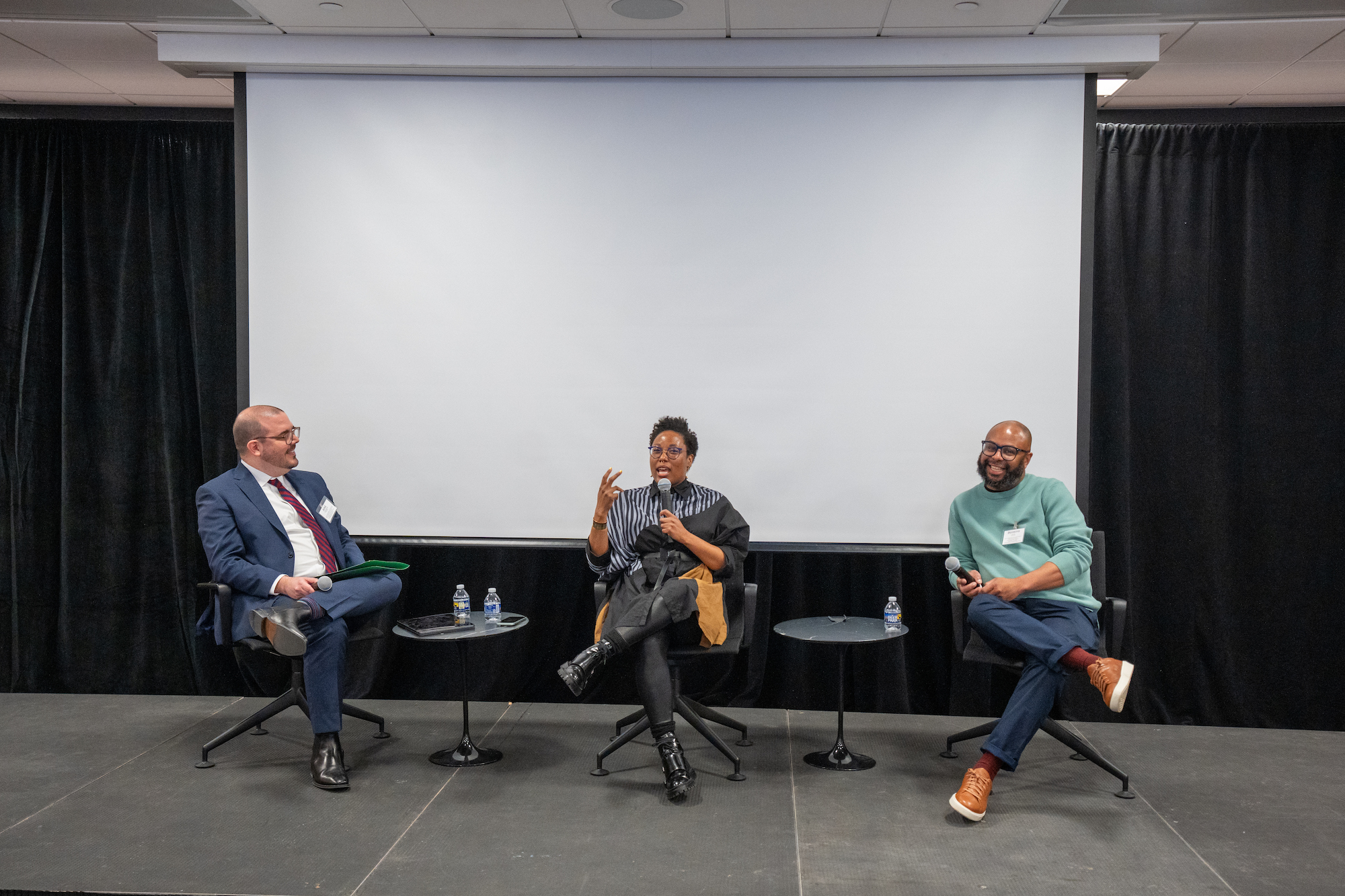
Desmond Upton Patton and Courtney D. Cogburn, both professors of social work, have spent much of their careers using technology to analyze trauma, racism, gun violence, and grief. While the work was meaningful, so was the burnout.
“Y’all, I have been looking at pain and trauma for over a decade. And it came to a halt for me,” Patton said. As he was tracking trauma on social media, Patton realized that young folks would often use joy, happiness, and humor to intervene when their peers became angry. Both Patton and Cogburn have now turned their attention to how social media and AI might spark joy and foster well-being.
Patton, a Penn Integrates Knowledge University professor, and Cogburn, an associate professor of social work at Columbia University, discussed their new research in the 2024 Albert M. Greenfield Memorial lecture, “Can Technology Spark Joy and Imagination? Intersecting Frameworks to Promote Health and Liberation.” Hosted by Penn Nursing, the conversation was moderated by José A. Bauermeister, the Albert M. Greenfield Professor of Human Relations.
Each spent a few minutes speaking about their own research before engaging in discussion. For Patton, social media is a community. He combines his training in social work with computational practices and qualitative methods to study social media, where, for many, “digital life is real life,” he said, “a community where we all hang out, where we live, where we learn, where there’s conflict, and where there are also opportunities for joy and healing as well.”
His new project is JoyNet, which utilizes AI and community-centered approaches to identify and disseminate joyful content and mental health resources for marginalized communities online.
Cogburn spent her early career working on racism, an interdisciplinary, “all-hands-on-deck problem,” she said. With computer science partners, she created a virtual reality experience that takes users through microaggressions experienced by a fictional Black male character at ages 7, 15, and 30.
Cogburn has since shifted to exploring what she calls “untethered imagination.” She imagines the metaverse as a space of joy and Afrofuturism.
“There is imagination as revolution—in response to oppression—and there’s imagination for the sake of imagination—wholly untethered and free, without purpose, promise, resolution, repair, or responsibility to anyone or anything,” Cogburn said. “What are the health benefits of that, of being able to dream and imagine and create and explore and be joyful without having to repair something you didn’t create in the first place?”
When Cogburn asked her students to experiment with the new Ray-Ban Meta smart glasses, they came up with ideas she had never heard in meetings with Meta, including translating language into dialects and using augmented reality to provide sign language, Cogburn said.
Patton said that he and Cogburn are often the only social work scientists consulted by social media platforms. While they both try to represent diverse points of view, more voices are needed to represent lived realities of joy and imagination, Patton said.
A lot of platforms have been optimized for negativity, Patton said. It’s important to have people present at upper-level meetings to suggest optimizing features to consider how social media can create change and foster community, he said.
Social workers and social scientists have to be involved in conversations around emerging technology, Cogburn said. “There’s a fear around technology; there’s a fear around AI; there’s this sense of just wanting to put your head in the sand and not engage and hope it goes away. The reality is, that’s not going to happen, and there’s power in engagement.”
Technology could be used as a tool to promote equity, she said. “It starts with us imagining what we can do.”
José A. Bauermeister is the Albert M. Greenfield Professor of Human Relations and chair of the Department of Family & Community Health in the School of Nursing, professor of psychiatry at the Perelman School of Medicine, director of The Eidos LGBTQ+ Health Initiative,, and a senior fellow at the Leonard Davis Institute of Health Economics at the University of Pennsylvania.
Courtney D. Cogburn is associate professor of social work and special advisor to the dean of the School of Social Work at Columbia University.
Desmond Upton Patton is the Brian and Randi Schwartz University professor, a Penn Integrates Knowledge University professor with joint appointments in the School of Social Policy & Practice (SP2) and Annenberg School for Communication, with a secondary appointment in the Department of Psychiatry at the Perelman School of Medicine and is chief strategy officer at SP2.







